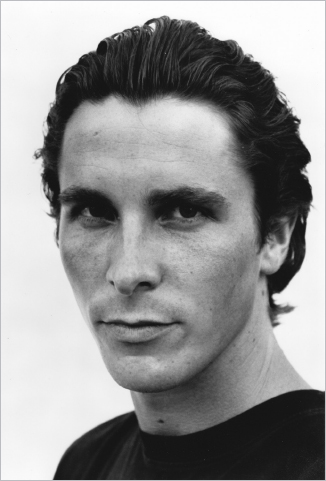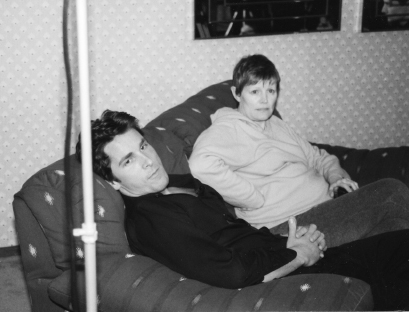Christian Bale (21 page)
Authors: Harrison Cheung

“We're just friends!” he scolded. He happened to be
very
good friends with Winona. They had clandestine meetings at hotels up the coast or in Las Vegas. She had asked him to come to the final deathbed party for Timothy Leary, her godfather. They were very good friends indeed. Christian, however, bristled at the idea of using his relationship with Ryder for publicity.
That year, Christian's dad had begun dating Charlotte Cornwell, a British acting coach living in L.A. David had need of comforting company. He was depressed and constantly in a state of worry about the family finances and his immigration status. He had long since overstayed his visitor's visa by over eight years.
Christian was not particularly fond of Charlotte, especially since the premiere of
A Midsummer Night's Dream
, when
Charlotte, trying to be helpful, offered Christian acting lessons. “A good English boy should know his Shakespeare,” she suggested. I almost burst out laughing at Christian's openmouthed shock at being offered lessons. I quickly steered him to the bar before he could reply.
David was, as always, very upset with Christian's agent. These were desperate times and he blamed her for never following up the promise of Christian's career after 1994's
Little Women
. And now, because of her (or so it seemed to David) the family was drowning in debt.
David, the self-proclaimed “financial advisor” had been fighting and losing a two-front war. To the American Internal Revenue Service (IRS), David told tax collectors that Christian was a British citizen and therefore not required to pay American taxes. To Britain's Inland Revenue, David told those tax collectors that Christian was an American resident and therefore not required to pay U.K. taxes. The resultâon February 6, 1998, the IRS filed a lien for the amount of $144,942 against Christian.
It seemed that all of David's plans were backfiring. Just before the lien showed up, David had bought a red 1974 Triumph TR6 for Christian's birthday (1974 was significant as it was Christian's birth year). But a few months later, neither Christian nor David could afford the car, so they suggested that I buy the car with the hope of holding onto it until Christian was financially able to take it back. All the jokes about British cars are true. I had to sell the car a few months later as it couldn't drive for more than ten miles at a time without breaking down.
A Midsummer Night's Dream
would be the last time Christian could take on a role without an eye on the paycheck. Christian reluctantly agreed to do a TV movie,
Mary, Mother of Jesusâ
the Easter story told from Mary's point of view. It was produced by Eunice Kennedy Shriver, and Maria Shriver, ex-wife of action movie superstar and California governor Arnold Schwarzenegger,
was thrilled to see the photos of Christian as Jesus. “Oooh! Sexy Jesus!” she said. Christian's costar would be Swedish actress Pernilla August, who's better known for her role as Schmi Skywalker, Anakin's mom from the
Star Wars
movies.
David was also thrilled. He had been making the rounds in Los Angeles, attending Democratic Party fund-raisers, eager to make
connections and network. What better than a connection with the Kennedy family?

This was Christian's official headshot that I took of him outside an office building in El Segundo in 2002. Christian was insistent that we not use an outside photographer!
However, when Christian declined Eunice Kennedy Shriver's invitation to attend the premiere of
Mary, Mother of Jesus
at the Kennedy Center in Washington, D.C., David was furious. How could Christian turn his nose up at America's legendary First Family, the Kennedys?
No amount of David's begging could change Christian's mind. He would not go to the Kennedy Center. When
Mary, Mother of Jesus
aired on TV, both David and Mojo looked very sad when they saw Christian as Jesus being beaten and crucified. In England, Jenny told me that she, too, had wept during those scenes.
Christian's paycheck from the production had saved the day, and Christian would look on his performance as Jesus with great amusement in contrast to what he would later be known for. That year, Christian's Christmas card featured him as Jesus waving hello.
Before Batman,
There Was Bateman
“I had people called up and say: âThis is career suicide,' and I just thought: âExcellent, that's great!' I was quite turned on by thatâby other people thinking it was going to ruin my career.”
âChristian Bale, 1999
“I wasn't afraid of being a despicable character from beginning to end. It's my trajectory to become possibly the most hated actor of the year.”
âChristian Bale, 2000
I
n 1999 Christian become the most hated actor on the planet when he took on the role of sadistic serial killer Patrick Bateman. It was a huge career leap for the young actor from Wales that many people thought was career suicide. Remember, his role before this one was Jesus. So it was obviously a calculated risk when he decided to pursue the controversial leading role in
American Psycho
, based on the best-selling novel by Brett Easton Ellis.
The book was an instant hit when it was published in 1991, landing on all the best-seller lists despite its content. The book was originally slated to be published by Simon & Schuster, who had published Ellis's first two novels,
Less Than Zero
and
The
Rules of Attraction
. But the company caved in to protests from the National Organization of Women, led by the feminist Tammy Bruce, and threats of a boycott. So two months before
American Psycho
was due to be published, Simon & Schuster pulled out, something practically unheard of in the publishing world.
Ellis still pocketed the $300,000 advance for the manuscript although he was left shocked by the company's reaction and the consequent arguments over censorship and decency. The book was quickly becoming a cause célèbre. But in early 1991 Vintage Books, a subsidiary of Random House then, quickly stepped in and purchased the rights to the novel, despite all the controversy and protests surrounding it.
After the book was published, Ellis received numerous death threats and hate mail. And it was easy to see why.
The book featured graphic accounts of main character Patrick Bateman's numerous murders, including vivid descriptions of sexual abuse and torture. Many of the murders themselves involved various forms of mutilation including genital mutilation. Ellis wrote graphically of yuppie Bateman examining the internal organs of some of his victims after murdering them. And one particularly horrific scene involved a naked woman, a pipe, some cheese, and a rat.
But none of the material or the public outrage that surrounded the book seemed to bother Hollywood. Plans for a movie went full steam ahead. The hunt was on for a star and a script.
Johnny Depp was the first actor formally attached to the project in the mid â90s, first with Stuart Gordon in talks to direct and then with David Cronenberg officially attached. The project was perfect for Cronenberg who had a reputation for shocking his audiences and was known as the King of Venereal Horror or the Barron of Blood. He had gained popularity with the head-exploding telepathy-based
Scanners
before releasing
Dead Ringers
, in which Jeremy Irons played twin gynaecologists who fall for the same woman, and then he did
The Fly
.
Eventually, Depp passed but Cronenberg remained involved, bringing on Brad Pitt, with Ellis writing the script himself. Pitt was hot off the success of his breakout roles in
Thelma and Louise
and
A River Runs Through It
, but he soon dropped out in favor of playing a cop chasing a serial killer in
Se7en
and the part of Jeffrey Goines in
Twelve Monkeys
, which earned him an Oscar nomination.
Edward Norton also passed on the role of Patrick Bateman. By this time, Cronenberg had lost interest, so producer Ed Pressman offered directing duties to Mary Harron. She signed to do the film on the condition that she could write her own screenplay with Guinevere Turner. Ellis's script was jettisoned because it ended with a big musical number at the Statue of Liberty! While other approaches to the book were more like slasher flicks, Harron and Turner's script was a satiric, feminist take on the book and the narcissistic â80s.
Before
American Psycho
, the Canadian-born, Oxford-educated Harron was probably best known for her 1996 indie film,
I Shot Andy Warhol
, which starred Lili Taylor and was nominated for the Grand Jury Prize at Sundance.
I Shot Andy Warhol
was about the life of radical feminist Valerie Solanas, who wrote the SCUM (Society for Cutting Up Men) Manifesto. That film was produced by long-time Todd Haynes collaborator Christine Vachon, who had just finished producing
Velvet Goldmine
.
Christian had heard about
American Psycho
and was desperate to play Bateman, an American Wall Street broker by day, murderer by night. He met with Harron and convinced her that he was passionate and 100 percent committed to the role. He had been working out on his own to bulk up his body, and he had developed the perfect yuppie American accent.
David did not want his son to even consider the part. “Career suicide” was the key phrase associated with this script, which was based on a book that most people considered unfilmable. David, who was constantly fighting Christian's agent, was now taking
her advice that
American Psycho
could ruin Christian's career with a new typecastâthat of serial killer/villain. David towed the traditional Hollywood line that a movie star needed to be likeable. Henry Fonda? Tom Hanks? Bruce Willis? Tom Cruise of the 1990s? Likeable. Loveable.
When David learned about Mary Harron's previous work, particularly the SCUM Manifesto, he was very suspicious. He told me: “This Mary Harron will make a fool of my son! He's too innocent to understand that women are the root of all evil. Don't believe me? Look it up in the Bible!”
But Christian was fixated. He loved the dark humor in the script. And while Christian himself was no feminist, he liked Harron's sense of humor and how Harron's script made fun of wealthy, materialistic American stockbrokers of the 1980s. Most importantly, this would be a showy, very American role where Christian could once and for all shed any image of being “just another British actor.”
“I don't want to be a movie star,” Christian would tell me more than once. “I want to be an
actor
. All this talk of career suicide . . . I rather like that I'm running contrary to what everyone expects.”
I was very proud of Christian's position. Sure, he was running against his father's advice, but after reading the
American Psycho
script, with its violence and sex, I could see that Christian would shatter any British actor stereotyping. Worst-case scenario, we decided, the film would be another little-seen indie flick, with minimal negative impact to Christian's career prospects. Best-case scenario, he'd break from the pack of other Young Hollywood men.
Harron told
Salon
why she considered Christian. “When I met with Christian and I watched his face, it wasn't a difficult decision. He reminded me of Lili Taylor in the sense that there was a lot below the surface. He had a sense of mystery and depth in his face. And I hadn't sensed that with anyone else.”

Christian and
American Psycho
director, Mary Harron, chilling in a hotel room at the Sundance Film Festival.